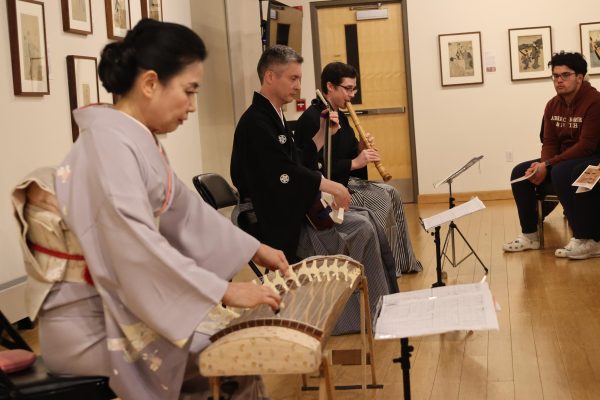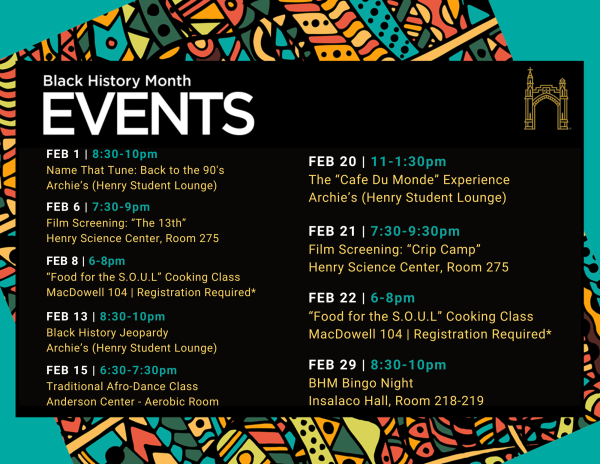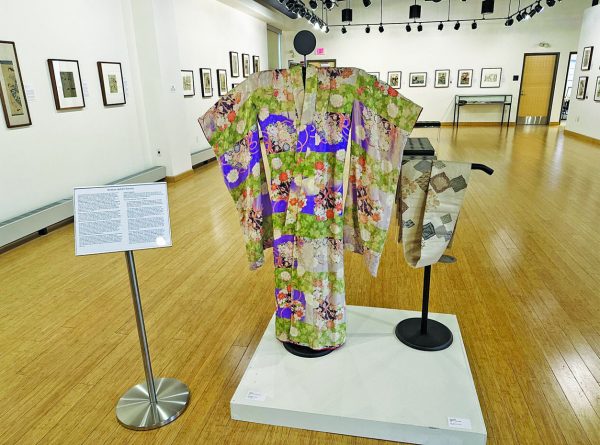Understanding Through Dialogue at ‘Food for Thought’
December 13, 2018
Students were thinking, but they weren’t necessarily looking for answers at the “Food for Thought” event held by the Department of Philosophy Nov. 27 in the McGowan Room of the Mary Kintz Bevevino Library.
The department holds the event twice each year, said philosophy professor Krisztnia Sajber. “Our goal is to provide a forum for students to discuss philosophical topics with contemporary relevance in a friendly atmosphere, with fellow students as well as the members of the philosophy department actively participating in the discussion.”
The events are free and open to all.
George Shea, Assistant Professor of Philosophy, said the event is not a debate.
“It’s a true civic exchange that models the best that democratic communities have to offer. Moreover, it embodies the spirit of public inquiry – the community comes together to pursue important questions that we couldn’t otherwise do by ourselves. So, it really involves sharing and growing together, which, ultimately, is at the heart of philosophy.”
Shea said sharing occurs through dialogue.
“Some of our previous forums have pursued really difficult questions, such as ‘What is whiteness?’ ‘How was it constructed?’ and ‘What are the social effects?'”
There were no specific topics for discussion, Nye said.
“It was just whatever the conversation was about. I think the main focus was on using your mind and thinking rather than the topics you talked about,” said sophomore mass communications and design major Kailene Nye.
“I felt like it wasn’t so much about the answers,” Nye continued, “as it was more about using your mind and using your ability to think.”
Shea said philosophy can only be explored through active sharing in real life settings.
“As a professor of philosophy, I’m pretty committed to the notion that we are the ideas that we hold. So, what I think is essential to who I am, how I see there world, and how I see others. Since the better part of our lives unfolds outside the classroom, this means that this is where philosophy is actually happening.
As the event offered food for the mind, there was also food the body.
“The event is called ‘Food for Thought’ because, besides the generous portions of thought offered for food, those in attendance also enjoyed a particularly tasty buffet,” Sajber added.
“There were all types of foods,” Nye said. “I think they had food from different cultures, too, which I found to be nice because it gave people a chance to try new things they have never tried while just talking and relaxing among others.”
The questions and statements proposed were not meant to concern those attending, but rather to help relax students and provide an outlet for stress at a time when they need calm the most.
“I think being in a collective environment did help,” Nye said, “because it made a lot of people more comfortable to talk when they saw others were. And yeah, I think hearing what was going on in other people’s heads was helpful because it gave you something to think about before you replied,” Nye said.
Sajber said students spoke eloquently about their appreciation for the significant role philosophy plays in their education. Philosophy teaches students a plethora of skills for future success, she said.
“Perhaps the best way to summarize the relevance of these skills, we decided at the conclusion of the event, is that philosophy leads one to exercise better judgment. It develops reading, analytic and argumentative skills. At times it can be difficult to read philosophical texts. Employers, however, value the preparation philosophy students bring to their jobs.”
Several members of the faculty and provided examples about why employers pick philosophy majors for leadership roles in their organizations, Sajber said.
Shea said intentional, critical thinking is crucial.
“We can only live our best possible lives when we try to, which means first and foremost attending to and caring for what we think. This is where it all begins.”
The next “Food for Thought” event will be held in conjunction with Women’s History Month.
“We are going to talk about how to make sense of gender in public discourse as well as recent news. During this March event, we will talk about how philosophy can help students make sense of the discussions taking place around the topic of gender on campus, at home, in the classroom, and in politics and society in general,” Sajber said.






